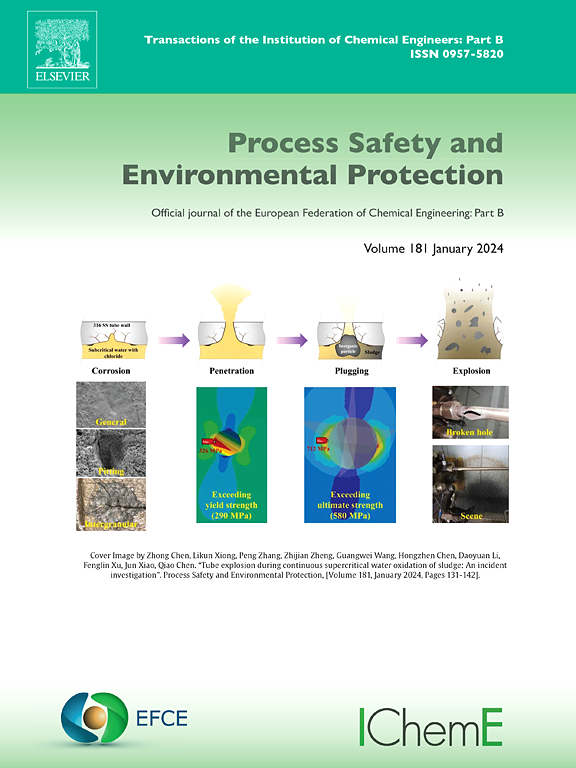利用热解技术从农业生物质中提取高价值化合物的级联方法
IF 6.9
2区 环境科学与生态学
Q1 ENGINEERING, CHEMICAL
引用次数: 0
摘要
农业废弃物、森林采伐剩余物和工业副产品等残留物具有双重优势,既是可持续的经济资源,又是可广泛利用的生物质,通常具有较低的市场价值,并可避免与粮食或饲料生产竞争。采用级联方法可提高资源效率,最大限度地减少浪费,同时产生高价值产品并促进能源生产。本研究旨在探索爱尔兰农业和非粮食废物生物质在促进可持续生物经济方面尚未开发的潜力。这些生物质库包括谷物秸秆和谷壳、短期轮作(SRC)柳树、马齿苋和各种草类。要减少对化石燃料的依赖并满足市场需求,利用这些资源生产化学品和燃料势在必行。在众多可用的生物质增值技术中,本文重点介绍热解技术--一种在无氧环境下高温进行的热化学过程。热解产生三种主要产品:气态合成气(包括一氧化碳和氢)、液态部分和固体残渣。此外,本综述还强调了热解油作为一种多功能资产的潜力,可用于生产生物基化学品,满足制药、药妆和营养保健品等行业的需求。本文章由计算机程序翻译,如有差异,请以英文原文为准。
Cascading approach for the extraction of high-value compounds from agricultural biomass integrating pyrolysis technology
Residuals such as agricultural waste, forest harvesting remnants, and industrial by-products present a dual advantage as sustainable and economical resources owing to their widespread availability of biomass, often possessing low market value and avoiding competition with food or feed production. Embracing a cascading approach enhances resource efficiency, minimising waste while generating high-value products and facilitating energy production. This study aims to probe into the untapped potential of Ireland's agricultural and non-food waste biomass for fostering a sustainable bioeconomy. These biomass reservoirs encompass cereal straw and husks, short rotation crop (SRC) willow, miscanthus, and various grasses. Leveraging these resources for chemical and fuel production is imperative to reduce reliance on fossil fuels and align with market demands. Among the plethora of available biomass valorisation technologies, this paper focuses on pyrolysis - a thermochemical process conducted at elevated temperatures in an oxygen-free environment. Pyrolysis yields three primary products: gaseous synthesis gas (comprising carbon monoxide and hydrogen), a liquid fraction, and a solid residue. Additionally, this review underscores the potential of pyrolysis oil as a versatile asset for generating biobased chemicals catering to industries like pharmaceuticals, cosmeceuticals, and nutraceuticals.
求助全文
通过发布文献求助,成功后即可免费获取论文全文。
去求助
来源期刊

Process Safety and Environmental Protection
环境科学-工程:化工
CiteScore
11.40
自引率
15.40%
发文量
929
审稿时长
8.0 months
期刊介绍:
The Process Safety and Environmental Protection (PSEP) journal is a leading international publication that focuses on the publication of high-quality, original research papers in the field of engineering, specifically those related to the safety of industrial processes and environmental protection. The journal encourages submissions that present new developments in safety and environmental aspects, particularly those that show how research findings can be applied in process engineering design and practice.
PSEP is particularly interested in research that brings fresh perspectives to established engineering principles, identifies unsolved problems, or suggests directions for future research. The journal also values contributions that push the boundaries of traditional engineering and welcomes multidisciplinary papers.
PSEP's articles are abstracted and indexed by a range of databases and services, which helps to ensure that the journal's research is accessible and recognized in the academic and professional communities. These databases include ANTE, Chemical Abstracts, Chemical Hazards in Industry, Current Contents, Elsevier Engineering Information database, Pascal Francis, Web of Science, Scopus, Engineering Information Database EnCompass LIT (Elsevier), and INSPEC. This wide coverage facilitates the dissemination of the journal's content to a global audience interested in process safety and environmental engineering.
 求助内容:
求助内容: 应助结果提醒方式:
应助结果提醒方式:


